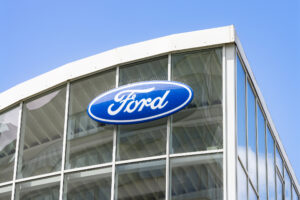
Ford pauses dealership EV certification program about a month away from implementation
By onAnnouncements | Business Practices | Market Trends
After two years of active encouragement, Ford Motor Co. is suspending its electric vehicle (EV) certification program for dealerships after rolling back requirements late last year, according to The Detroit News.
Ford told dealerships in December 2022 that they’d be required to invest in training and charging stations to qualify for certification to sell electric vehicles. Just short of a year later, Ford reduced the number of charging stations the dealerships would need for each certification level.
Dealerships were given a June 30 deadline to meet requirements for the program, but Ford has recently put a pause on that, as it says it plans to review requirements once again, the article says. It says the review is planned for next month.
The article says the decision comes after Ford did a “Dealer Engagement Tour.” During the tour, it met with more than 1,000 dealers over 11 meetings.
“We’re now in the process of reviewing all that collaborative engagement and turning it into immediate, mid-term, and long-term changes where it makes sense for our customers, our dealers, and Ford,” spokesperson Marty Günsberg said in a statement to the newspaper. “We will have more specific details to share in a few weeks.”
The company responded to the newspaper via email in November saying changes at that time were part of a continual adaptation of the overall EV strategy, along with response to dealership feedback and supply chain and infrastructure delays.
The November changes reduced the number of Level 2 chargers from five to two for dealerships that want to be “certified,” the article says. A “certified elite” program was reduced to require three instead of five chargers. The certified elite program originally required a fast charger by 2026 but that was removed.
Leve 2 chargers convert AC to DC using a converter in the EV, while a fast charger the conversion happens in the charging station to supply power and charge vehicles faster.
About two-thirds, or 1,920, of dealerships had signed up for the EV charging program as of late last year, the company reported, according to The Verge.
The article says a majority (1,650) of the dealerships that signed up for the program opted to be certified elite.
Originally, the program limited the number of EVs a dealership was authorized to sell to 25 if they opted for just being certified, according to the Verge. It’s unknown if Ford has changed the number of EVs each status is allowed to sell.
Ford has taken other noticeable steps back from EVs recently.
Bloomberg recently reported the company is losing up to $100,000 per electric vehicle and is cutting orders from battery supplies.
Bloomberg also reported that Ford planned to reduce spending by $12 billion on battery-powered models with EV losses forecast at up to $5.5 billion this year.
Ford has delayed the launch of a battery plant it planned to build with South Korean manufacturer SK in Kentucky, along with pausing construction of a battery plant in West Michigan’s Marshall, according to the November Detroit News article.
The company also shifted two-thirds of its F-150 lightning factor workforce to other projects in March, according to The Detroit Free Press.
IMAGES
Photo courtesy of gopixa/iStock
